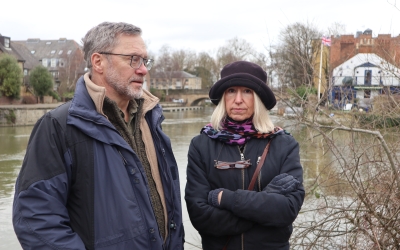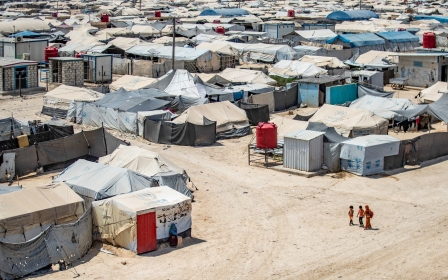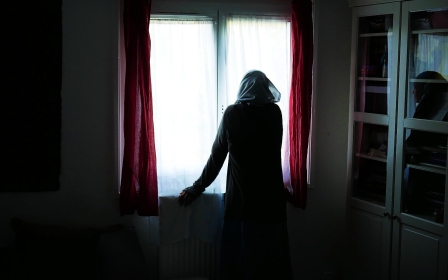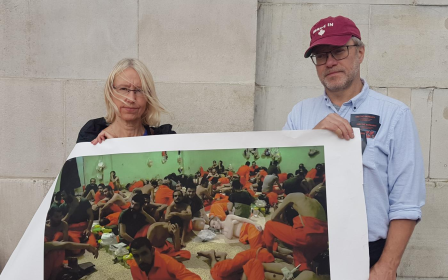Jack Letts' mother hails 'rights victory' as Canadians to be repatriated from Syria

The mother of Jack Letts, a British-Canadian man held among suspected Islamic State group (IS) fighters in prison in northeast Syria, has hailed Canada's decision to repatriate him along with 22 other of its citizens.
Speaking to Middle East Eye, Sally Lane said: "We're overjoyed about this news. It feels surreal as we've been battling to get Jack back for so long, but the news has gone round the world so it must be true."
Canada said on Saturday that it would take back the group of citizens, who include six women, 13 infants and four men, after relatives of the detainees took the government to court over the violation of their charter rights.
A day earlier, the Federal Court ordered the repatriation of the men, citing poor conditions in prison and that they had not faced a trial or been charged.
"The conditions of the... men are even more dire than those of the women and children who Canada has just agreed to repatriate," the judgement stated.
New MEE newsletter: Jerusalem Dispatch
Sign up to get the latest insights and analysis on Israel-Palestine, alongside Turkey Unpacked and other MEE newsletters
"There is no evidence any of them have been tried or convicted, let alone tried in a manner recognised or sanctioned by international law."
Aside from Letts, the majority of the other detainees have remained anonymous during the court case.
"I have heard from the children and the families and they are 'over the moon' with happiness," Lawrence Greenspon, who represents 22 of the 23 individuals to be repatriated, told MEE.
"The judgement reaffirms the principle that Canadians, no matter where they are, if their rights are being violated, are entitled to a remedy. That remedy is for the Canadian government to act, where they can, to stop the violation."
Letts is a Muslim convert from Oxford who travelled to IS-controlled areas of Syria and Iraq aged 18 in 2014.
Like many other British dual nationals in Syria, he has been stripped of his British citizenship because the family are also Canadian nationals. His family have long stated that there is no evidence that he was an IS fighter.
They say he was imprisoned by IS and spent much of his time in Syria in hiding before escaping from territory controlled by the militant group in 2017.
"The federal government has been ordered to go to the region to bring back the men, and the judge has said this has to happen 'as soon as possible'," Lane told MEE.
“He [Judge Henry Brown] referred to the Canadian Charter of Rights and Freedoms, international humanitarian law, and the Magna Carta in his judgement, so this case will have global implications for the cases of all the other detainees, particularly the men."
She added that the ruling meant this was likely to be "the first time that men will be repatriated according to a court order anywhere in the world".
'The judiciary came through'
In 2019, MEE revealed that the UK foreign office drew up plans to assist Letts in order to save him from alleged torture but chose not to act after then-prime minister Boris Johnson was briefed that there was no public sympathy for his predicament.
"It has been a very long time in coming, but this is finally a victory for human rights over false assertions of national security or the presumption of guilt before innocence," Lane said.
"Britain, in particular, which has been the most recalcitrant and authoritarian government over this issue, should take note of this judgement and bring all its people home."
MEE also revealed in February 2020 that British counterterrorism police used Prevent, a Home Office-funded programme, to gather intelligence from Letts's parents.
Lane, who has moved to Canada, said that the decision would have never occurred if she had remained in the UK.
"Although the Canadian government has fought as hard as Britain to prevent repatriation, its judiciary finally came through," she said.
Canada is one of several western countries to have faced criticism from human rights monitors over their failure to repatriate nationals who are among thousands of detainees held in camps and prisons since the collapse of IS in 2017.
Approximately 10,000 men and hundreds of adolescent boys are held in 14 overcrowded prisons in Syria's northeastern Hasakah region. Women and children live in two camps, al-Roj and al-Hol, that are home to around 60,000 people, including about 20,000 from Syria, 31,000 from Iraq, and up to 12,000, including 4,000 women and 8,000 children, from other countries.
In letters sent to the UK and Canadian governments last June, five UN special rapporteurs said the repatriation of all foreign nationals was "the only international law-compliant response to the complex and precarious human rights, humanitarian and security situation faced by those detained in inhumane conditions in overcrowded prisons or other detention centres in North-East Syria".
The letters highlighted the case of Letts, and said there were strong grounds to believe citizenship-stripping powers were being used by the British government in an arbitrary manner amounting to a "violation of international law".
Middle East Eye delivers independent and unrivalled coverage and analysis of the Middle East, North Africa and beyond. To learn more about republishing this content and the associated fees, please fill out this form. More about MEE can be found here.





